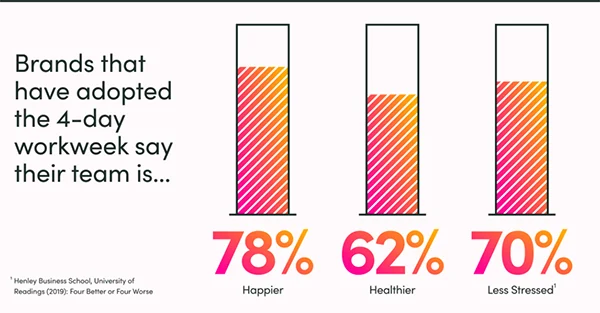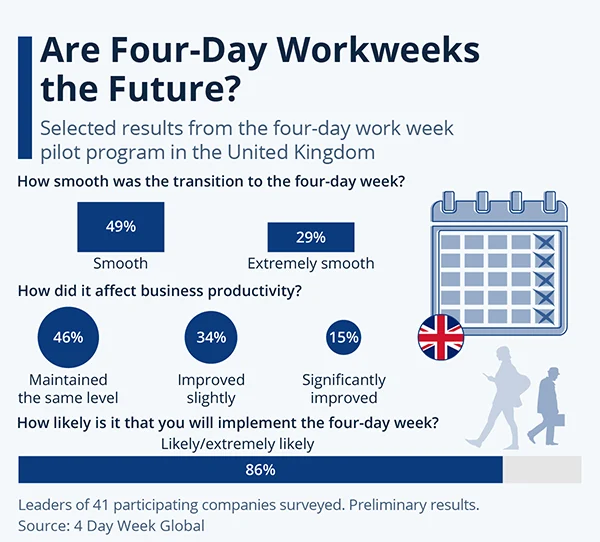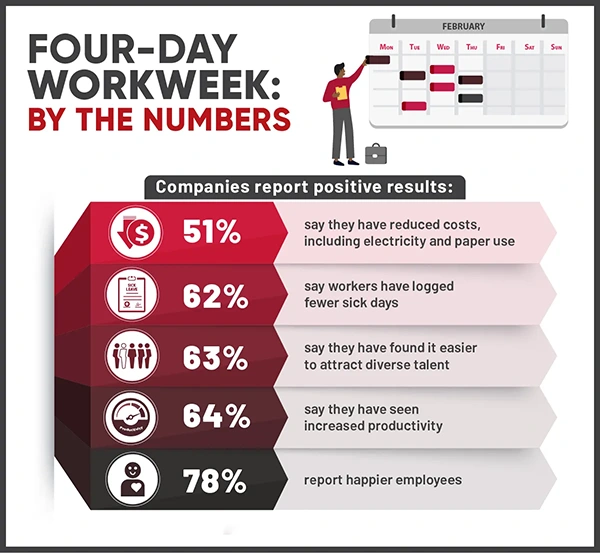Exploring the Impact of Shortened Workweeks on Productivity and Employee Well-being
Increased productivity
Working fewer hours per week leads to greater creativity and productivity. According to a study by tech firm Draugiem Group, 52 minutes of work and a 17-minute break after that is the perfect work-to-break ratio.
Another recent study found that reduced work hours led to an improved work-life balance and increased job satisfaction without any effect on performance. Also, learn about Macys Employee Login in this guide.
Shortened workweeks also lead to better mental and physical health. Researchers found that people who worked longer than 55 hours per week were 13% more likely to suffer from heart disease and 33% more likely to have a stroke than people who worked 35–40 hours per week.
Other research has shown a link between long work hours and increased anxiety, stress, and depression.
Higher engagement and lower absenteeism
Shorter workweeks also benefit employers. By using a time clock app to set reduced work hours, companies can increase employee loyalty, lower turnover rates, and increase motivation.
A Workforce Institute report showed that organizations offering shorter workweeks have lower absenteeism and higher employee engagement rates.

Reduced overhead costs
Shorter workweeks help reduce supply, rent, energy, and other overhead costs. Costs for hiring extra staff or overtime pay might increase, but the savings from increased loyalty and reduced overhead costs compensate for these expenses.
Case studies
Australia and Brazil implemented four-day workweeks in 2022 and 2023, respectively. In Australia, a trial involved 20 companies, and employees received full pay for working 80% of their typical hours.
Businesses saw 8.6% fewer people quit their jobs and a 44.3% decrease in the number of personal and sick days taken per employee monthly. After the end of the trial, 95% of the companies wanted to continue with the four-day week.
96% of the staff expressed wishes to continue it, rating it as 9/10. 54% of workers said they were more productive, and 96% lowered their work time, with just under 90% getting one extra day off per week.
The impact on well-being was equally impressive. Reductions in burnout were reported by 64% of employees, and 38% said the reduced workweek made them less stressed.
62% of workers reported experiencing an increase in positive emotions, and just under 50% reported a decline in negative ones.
Finally, around half of the members of the staff experienced reduced conflict between family and work, and 65% of the staff were generally satisfied with their work-life balance.

The four-day workweek in Brazil
Brazil launched a nine-month trial of a shortened workweek in September 2023. The results for some of the companies that participated have been reported. We will look at two of them: Zee.Dog, a pet products company, and the data company Winnin.
Employees of Zee.Dog experienced significantly elevated job satisfaction, enjoying mid-week breaks once every two weeks.
They became more enthusiastic about their work and happier overall. The shift allowed them to maintain productivity levels by prioritizing tasks quickly and effectively.
Employees of Winnin became 41.9% proactively focused on their physical and mental health. This made it possible for them to engage in a variety of activities that contributed to their well-being, resulting in a job performance increase.
Do You Know?
According to an employer’s survey, 81% of the workers prefer a 4-day workweek. While 54% of them say they are ready to work longer hours.
The four-day workweek in France
Most recently, France has launched a shortened workweek pilot. Companies have until July 31, 2024, to submit applications for participation. The plan is for 50 companies to adopt a 32-hour week without any salary reduction.
The results have yet to be reported, but France is already lenient on working hrs by global standards.
Under French law, employees may not be on duty for more than ten hrs a day and 44 hrs a week, including overtime. At the other extreme is the United Arab Emirates, which tops the list of countries with the longest workweek. On average, people in the UAE are employed 52.6 hrs per week.
Recap
- Productivity either increases or stays the same
- Health and well-being improve
- Employees are more engaged
- Businesses either save or don’t lose money
- The results of 4-day week pilots in Australia and Brazil were excellent

Bottom Line
The move towards a shorter work week has gained a lot of momentum over the past couple of days. The system comes with a variety of attractive benefits such as an appropriate work-life balance, a lot better mental health, and an overall lower production cost.
However, this type is not fair for every business, especially the ones with efficient customer service, or it can also result in lower productivity.
